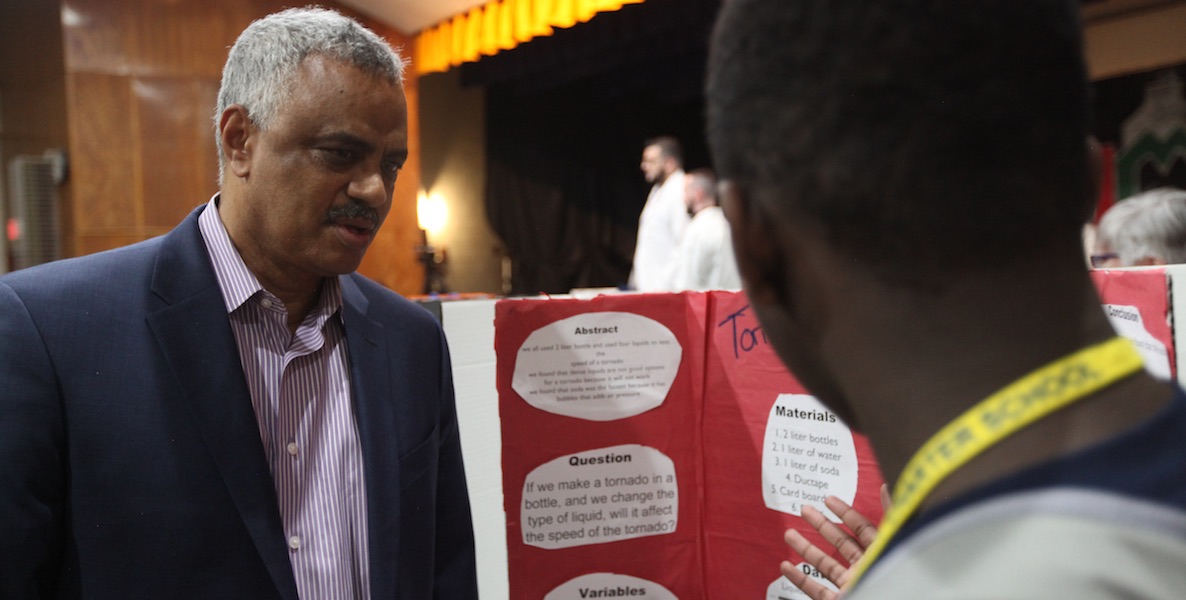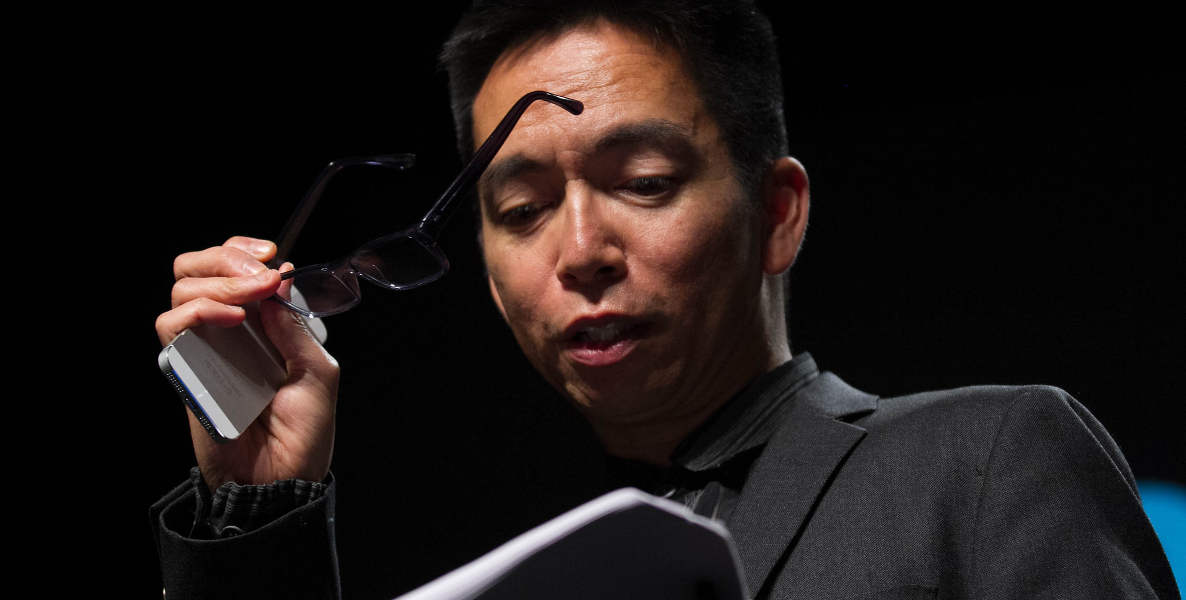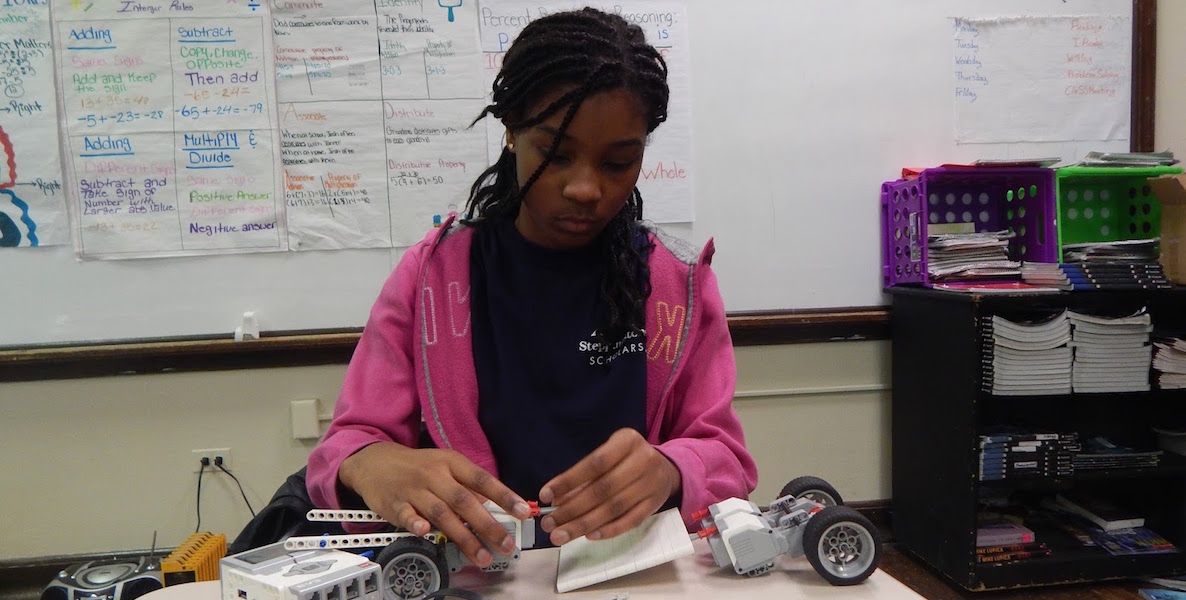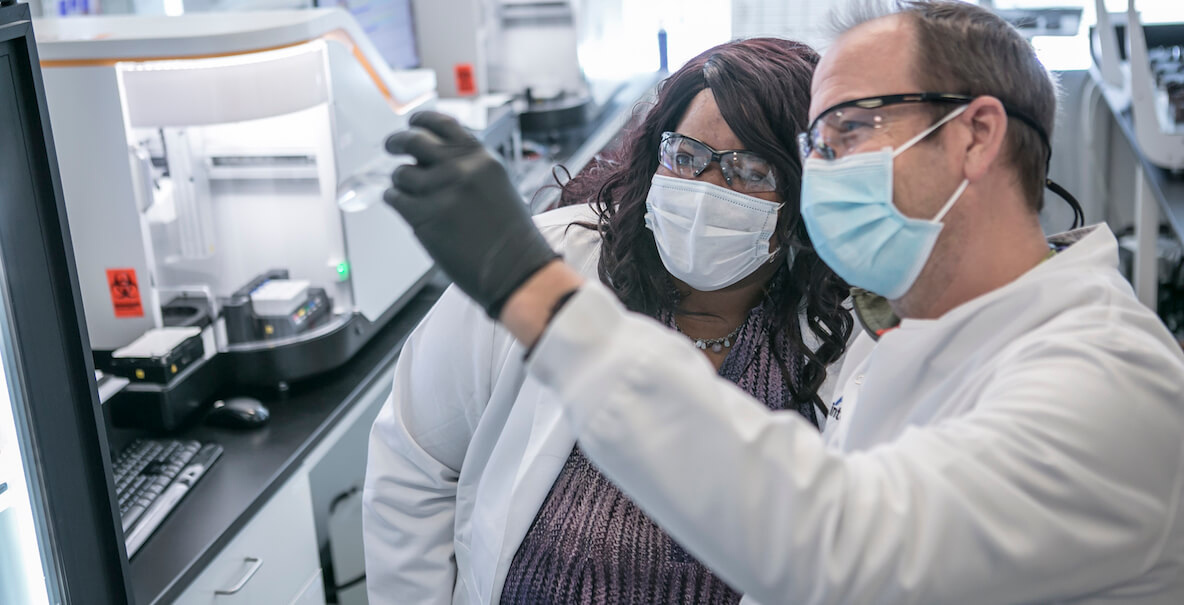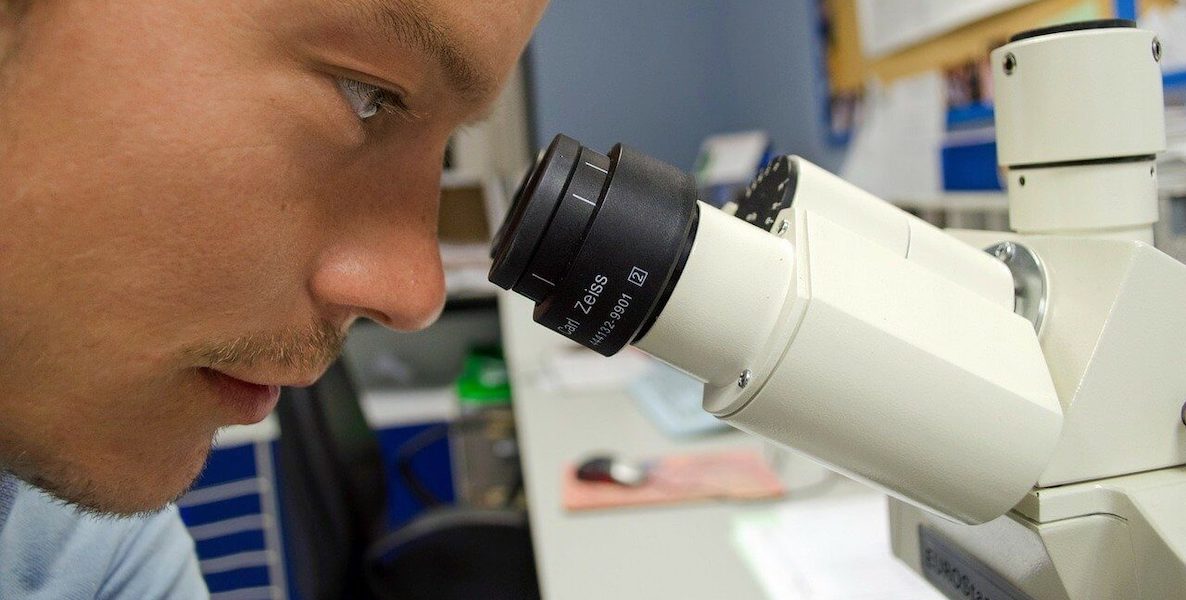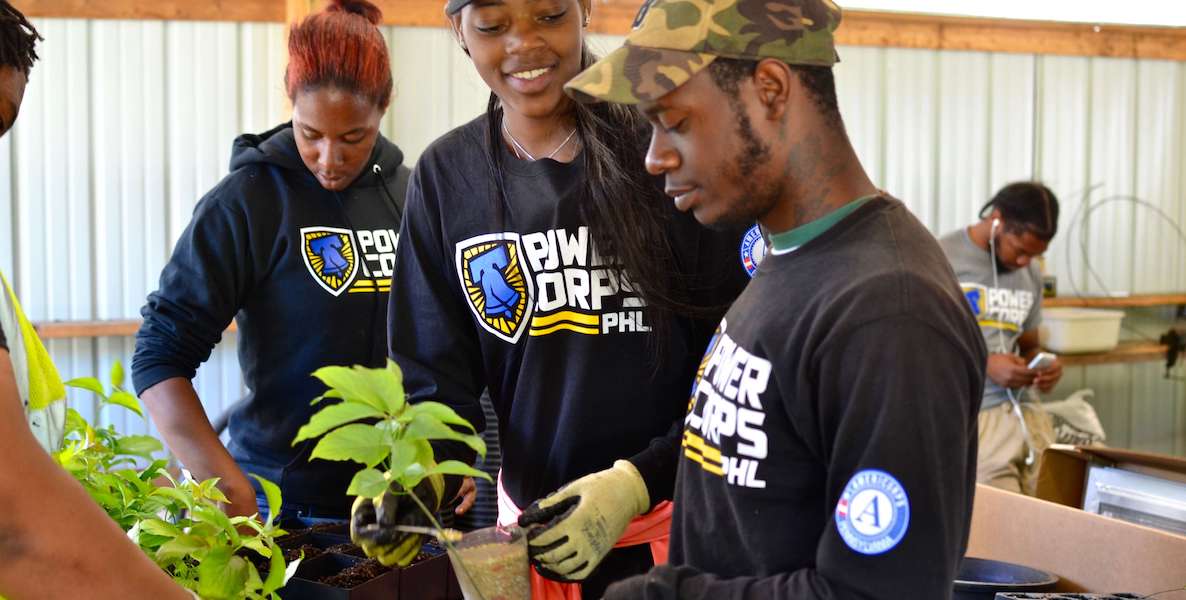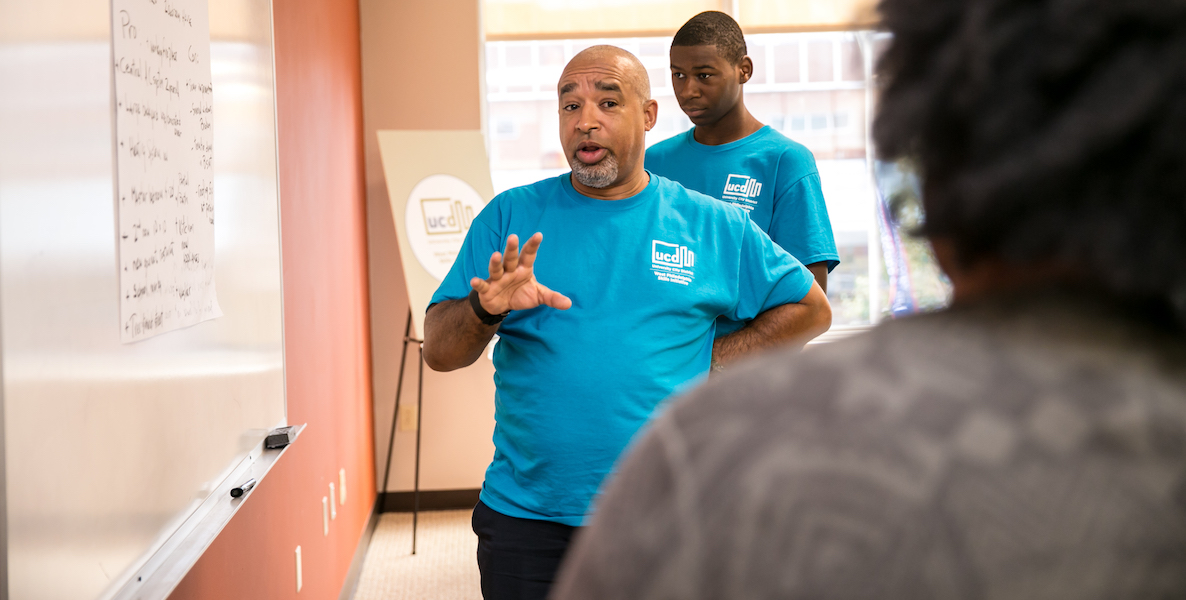![]() These days, you can’t come in contact with a local school (be it online or in-person) without being hit in the face with some form of STEM curriculum: Rube Goldberg contests have become de rigueur in the way that dioramas and book reports used to be.
These days, you can’t come in contact with a local school (be it online or in-person) without being hit in the face with some form of STEM curriculum: Rube Goldberg contests have become de rigueur in the way that dioramas and book reports used to be.
From Mantua to the Main Line, there are STEM classes, camps, extracurricular programs, and grant funding up for grabs to train youth in science, technology, engineering, and math, skills thought to be critical to preparing our nation for 21st-century employment.
And all of that attention on youth is great—full stop.
But in that focus on young people, another group often gets overlooked: adults—in particular, those who may not have a PhD or elite science pedigree or even a college degree, but who could surely find meaningful employment in our city’s burgeoning biotech and life science industry with even a bit of specialized training or contacts in the field.
In a city where the poverty rate continues to hover at nearly 25 percent, in part because incomes are too low, careers in biotech and health—which continue to be among the fastest-growing sectors in the city—could pave the way out of poverty. One report from May 2020 projected a 94 percent growth in employment over the next 10 years in the Philly region’s cell and gene therapy industry alone.
“You want to invest in Philadelphia? Well, those same people your company is going after as customers or patients are the same people who are looking for these jobs,” Brooks says.
The folks at the nonprofit University City Science Center recognize this. That’s why, last summer, they launched BULB: Building and Understanding Lab Basics. It’s an intensive, two-week program open to any Philadelphia resident with a GED or high school diploma who’s had some kind of workforce experience. Its mission: to develop more opportunities for Philadelphians to attain “family-sustaining” careers in high-growth STEM industries.
![]() BULB participants focus on five key areas: basic lab safety, microscopy (how to use a microscope), and three common lab processes—gel electrophoresis, DNA and RNA isolation, and ELISA assay. In the spirit of it not always being what you know but whom you know, they’re also partnered with a mentor in the field, a scientist who can answer their questions during and after the program, and expand their networks.
BULB participants focus on five key areas: basic lab safety, microscopy (how to use a microscope), and three common lab processes—gel electrophoresis, DNA and RNA isolation, and ELISA assay. In the spirit of it not always being what you know but whom you know, they’re also partnered with a mentor in the field, a scientist who can answer their questions during and after the program, and expand their networks.
Phil Brooks, director of STEM Workforce Partnerships at the Science Center, believes that there are all sorts of avenues for people to be a part of Philly’s STEM workforce.
“Yes, a lot of local companies are looking for high-level talent: They’re looking for VPs, they’re looking for people to run a team and a lab. But when I dive deeper into my conversations with companies, they say, Hey, we need folks who are accountants, we need folks who are executive assistants, we need folks who have customer service or maybe a healthcare background and are really good with people,” he explains.
“So if an executive assistant opportunity comes up at a biotech company, and our graduate has the BULB curriculum under their belt, they understand the basics of what that company does on an everyday basis, and that’s just adding to the pot of their work experience in a way that’s going to make their interview more attractive,” Brooks says.
Community connections
BULB is the brainchild of Brooks, who’s no stranger to the intersection of Philly’s workforce development and science realms.
Growing up in West Philadelphia, Brooks spent time as a child living in shelters before he headed off to Girard College. (Fun Philly fact: He went to elementary school with GreenLight Philadelphia CEO Omar Woodard.) He’d always loved science, and after college he started working in the nonprofit education sector, spending nearly a decade at City Year before joining city government, working for mayors Nutter and Kenney on STEM workforce development initiatives.
Youth have always—and will always—be dear to Brooks’ heart. But he recognized that as our city’s life science scene grows, so too do opportunities for residents who may not have been plugged into the sciences in school, but still have important skills to offer. With his extensive network of contacts throughout the city and within the life sciences, he wanted to carve out a path for them.
He mapped out the BULB program by consulting with his contacts to find out what roles they were looking to fill, and what skills they valued.
“We’re not ignorant to the fact that it takes certain degrees to have certain roles. But with so many different life science companies planting their flags in Philadelphia, it’s more cost-effective to hire from the local region, and it gets you more connected with the community in a way that isn’t just a statement of saying Hey we’re going to print out this racial equity statement to say we’re doing something and then not actually doing something. It puts your money where your mouth is,” Brooks says. “You want to invest in Philadelphia? Well, those same people your company is going after as customers or patients are the same people who are looking for jobs.”
He put a call out for applications throughout the city, leaning on programs like the West Philadelphia Skills Initiative and The Dornsife Center for Neighborhood Partnerships at Drexel to help spread the word. In less than two weeks, he had more than 100 applications.
![]() So far, 22 people, ages 19 to 65, have participated in BULB’s summer and fall cohorts; 19 have been women, and 20 have been people of color, which is meaningful at a time when both of those demographics continue to be underrepresented in STEM fields. To date, two have received paid internships, and Brooks’ focus going forward is on working with local employers to guarantee that all participants receive internships, apprenticeships or full-time positions.
So far, 22 people, ages 19 to 65, have participated in BULB’s summer and fall cohorts; 19 have been women, and 20 have been people of color, which is meaningful at a time when both of those demographics continue to be underrepresented in STEM fields. To date, two have received paid internships, and Brooks’ focus going forward is on working with local employers to guarantee that all participants receive internships, apprenticeships or full-time positions.
The program is still too small and too young to gauge its larger impact; to really make a dent in the city’s employment problem, it would need to reach thousands, not dozens of people. But the Science Center is committed to continuing and scaling it: Last month, in fact, BULB was one of just seven grant recipients, from among 80 applicants across the country, of the Economic Development Administration’s (EDA) STEM Talent Challenge, to boost local science, technology, engineering, and math talent. BULB will receive $246,179, with the Science Center matching that; that funding will enable the Science Center to run the program three times per year, for the next two years, with cohorts of about 12 people.
“It was rough [growing up] in West Philly. But I can both sympathize and empathize with the folks that we’re trying to get into some of these positions,” Brooks says.
Originally created as an in-person program, BULB is being held online during the pandemic, with participants being sent highly sophisticated at-home tools, laptops, and protective equipment to use during three-hour Zoom classes. Each participant also receives a stipend of $350, with the recognition that they might be forfeiting work hours to participate.
As he looks to create a measurable impact throughout the city, Brooks is also currently in talks with local universities to develop the program into one that will result in a professional certification. “We can say all the livelong day that they had amazing instructors, they went through X amount of weeks of a program, they learned all this stuff. Some people will take that seriously and say We contributed to your curriculum, so we know the authenticity of your program. But to reach other companies, to reach a wider audience, to reach the midsize and large-size companies, they either want to see degrees or certifications. So that’s the next big hurdle for us,” he explains.
Building bridges
Tabb Sullivan is a senior scientist at Integral Molecular, the West Philly-based biotech company. He got involved with the Science Center through its FirstHand Program, which is targeted at high school students. Now, he’s involved with BULB as part of application reviews—Brooks and his team at the Science Center intentionally defer to a panel of science professionals to make admittance decisions—and the mentorship process. And he believes there are roles for people of all backgrounds in Philly’s science scene.
“For a very long time, Integral Molecular was a sort of lab-heavy company. But as we grow, we’re not all in the lab; there’s a lot of administrative and support staff that make it possible to do what we do in the lab,” he says.
Liz Barden was part of BULB’s 10-person fall cohort. A mom of three, she currently attends Delaware County Community College. She joined BULB with a vision of pursuing medicine, as a nurse or a doctor; then, her instructors—Ebony Dyson, a 9th grade teacher at Abraham Lincoln High School in Mayfair, and Dara Ruiz-Whalen, co-founder of the science education nonprofit eCLOSE Institute— introduced her to the field of epidemiology.
![]() “The more research I did, the more I learned about how epidemiologists work side-by-side with health departments, looking at certain demographics and areas, and why certain conditions like diabetes might be higher in one area than another,” she says. She was drawn to epidemiology’s big-picture look at how factors like race and economics affect health outcomes too.
“The more research I did, the more I learned about how epidemiologists work side-by-side with health departments, looking at certain demographics and areas, and why certain conditions like diabetes might be higher in one area than another,” she says. She was drawn to epidemiology’s big-picture look at how factors like race and economics affect health outcomes too.
Now, Barden is looking forward to pursuing further coursework and training in the field, and she recently landed a paid internship at eCLOSE Institute. And Barden is proudly passing her BULB materials on to her six-year-old daughter, a budding scientist herself. Another participant took the class with her teenage son in the room with her.
“That’s been one of those benefits that we didn’t anticipate, but it’s super-important that young people have as many sources of encouragement as possible, including their parents,” Brooks says. “Beyond media and their teachers, if they’re getting bombarded with hope for the future and hope in STEM careers and the idea that you don’t need to have a four-year degree to work at a science company, then that’s really important as well.”
For Brooks, bringing more voices to the STEM table isn’t just a feel-good motto; it’s personal.
“I had certain opportunities in my life that I took full advantage of, and they led me here,” he says.
He doesn’t want to give the community any kind of B.S.; prior to the pandemic, he visited barbershops and other community gathering spots, asking people: Is this something folks from 52nd and Hazelwood would even entertain? Would folks from Baltimore Avenue even talk about this?
“It was rough [growing up] in west Philly. But I can both sympathize and empathize with the folks that we’re trying to get into some of these positions,” he says. “This is something that I firmly believe in, and I’m going to go above and beyond. When the role came up at the Science Center, my science nerd brain went into overdrive. I was like Let’s do it: Let’s use my passion to really impact the part of the world that raised me, to impact what the region can look like.”
BULB participant Joe'Nell Williams in Integral Molecular's lab with scientist Tabb Sullivan. Photo by Kevin Monko



